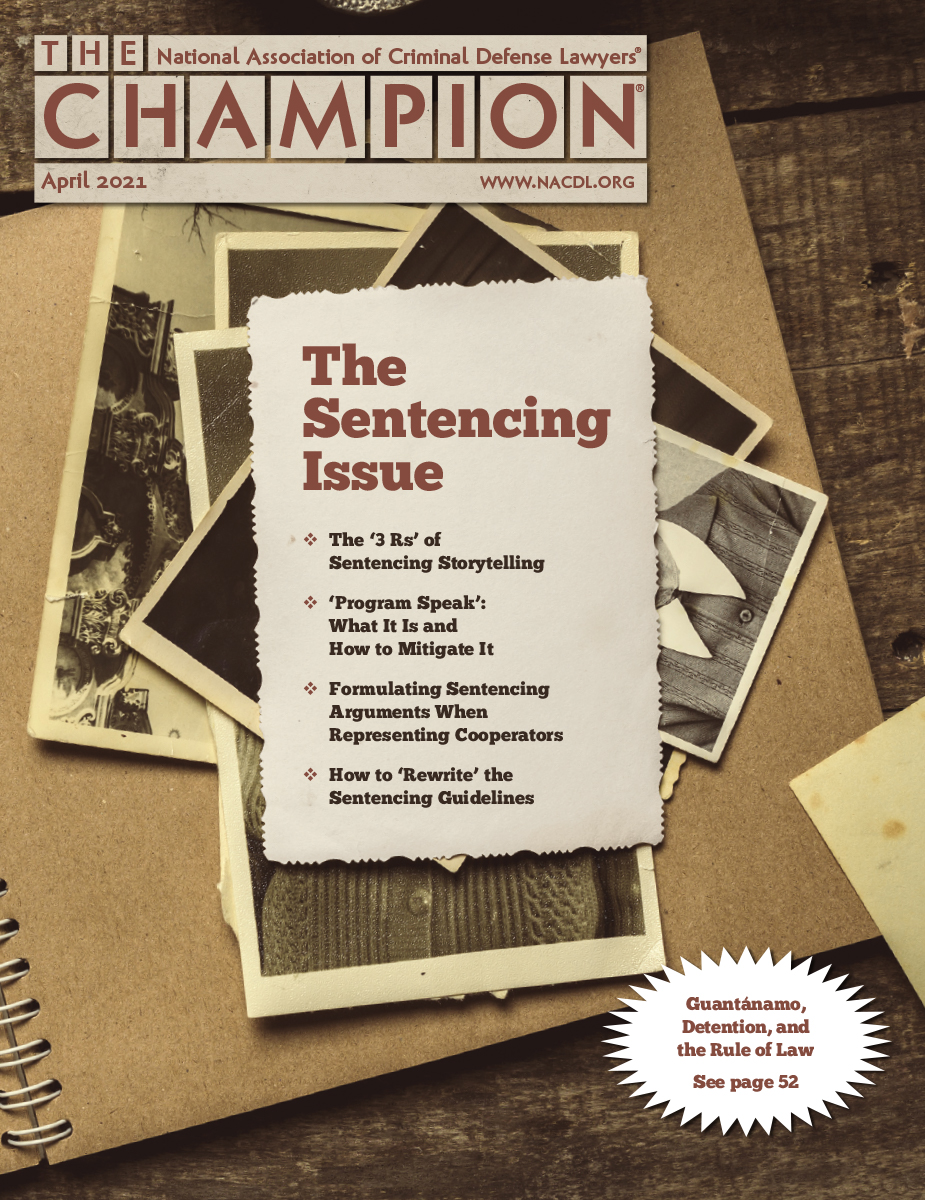April 2021

What strategy can defense lawyers use to develop an effective sentencing story?
Articles in this Issue
-
Affiliate News
What events are NACDL affiliates hosting this month? Find out here.
-
Cross Country: Many Witnesses, Many Versions: Creating a Multiple-Witness Comparison Chart
Larry Pozner explains how to create a multiple-witness comparison chart.
-
Defense Lawyers Can ‘Rewrite’ the Sentencing Guidelines, One Case at a Time
How can defense counsel obtain a sentence below the range recommended by the Sentencing Guidelines? The common approaches can be enhanced by two things that defense lawyers seldom use: the U.S. Sentencing Commission’s data on actual sentences and precedents “hidden” from standard legal search engines.
-
Formulating and Presenting Effective Sentencing Arguments When Representing Cooperators
When representing a cooperator, some defense lawyers tend to cede to the government three critical assessments that must be determined: the value of the information the cooperator provides, the cooperator’s relative worth as compared to others similarly situated, and the extent of the departure due under U.S.S.G. § 5K1.1. The authors describe the pitfalls lawyers should avoid when representing cooperators.
-
From the President: Gratitude for Being a Criminal Defense Lawyer
Years ago, there was a chief judge who did not like presiding over bond reconsideration motions. All the men and women who were presumed innocent yet unable to post bond suffered under this chief judge.
-
Inside NACDL: NACDL’s Effort to Confront the Trial Penalty Gains Momentum
NYSACDL Report Confirms Near Extinction of Trials in the Empire State
In March 2021, NACDL and NYSACDL released the trial penalty report. The report defines what practices are encompassed by the trial penalty, identifies the underlying causes, depicts it through profiles of individuals, and proposes concrete reforms to curtail the prevalence of the trial penalty.
-
NACDL News: Last Prisoner Project and NACDL Establish Cannabis Justice Initiative
NACDL News for April 2021
-
NACDL News: NACDL and ACDL-NJ Call on Gov. Murphy to Sign S3456, Repealing Mandatory Minimums
for Certain Offenses
NACDL News for April 2021
-
NACDL News: NACDL Applauds Abolition of the Death Penalty in Virginia
NACDL News for April 2021
-
NACDL News: NACDL Screening of ‘The Mauritanian’ and Panel Discussion
NACDL News for April 2021
-
NACDL News: NACDL Statement of Support for Myanmar Attorneys and the Rule of Law
NACDL News for April 2021
-
NACDL News: NACDL’s Corrections Committee Launches Online Resource
Tracking the State of Prison and Jail Communications Systems
NACDL News for April 2021
-
NACDL News: New York State Association of Criminal Defense Lawyers and NACDL Publish Groundbreaking
Report on Trial Penalty in New York
NACDL News for April 2021
-
The ‘3 Rs’ of Sentencing Storytelling
Defense lawyers tell only three types of sentencing stories. These stories involve Revelation, Relativity, and Redemption. Understanding the “3 Rs” of sentencing storytelling will help the defense craft the strongest mitigation arguments and achieve better results for clients.
-
The NACDL Q&A: Defending the Rule of Law
Mohamedou Ould Slahi, Nancy Hollander, and Theresa Duncan talk about Slahi’s detention at Guantánamo and about The Mauritanian, the movie that gives an account of his ordeal.
-
The Perils of Parole and ‘Program Speak’: Understanding and Managing Culpability Statements
in Post-Conviction Settings
During parole board hearings, sometimes a client will use language indicating that he deserved a severe sentence for his crime. Clients learn this language while attending prison programs that subtly teach them to say what the parole board wants to hear. The client may use this language (“program speak”) even though he committed no crime. In doing this, however, the client may foreclose any future possibility of clearing his name. How can a defense lawyer mitigate such statements?
